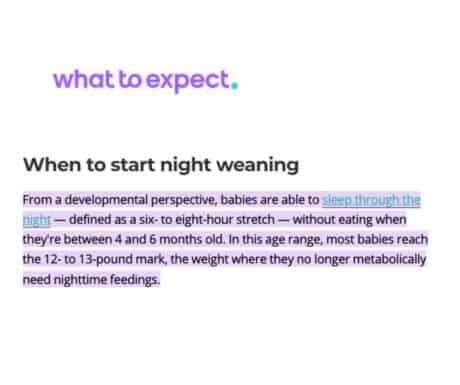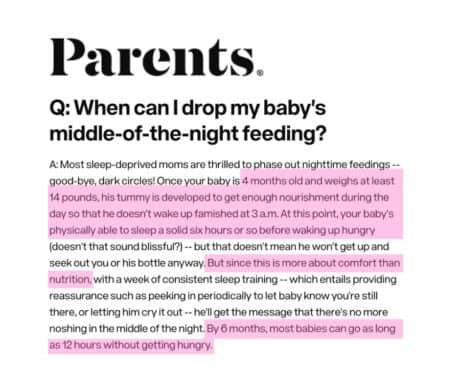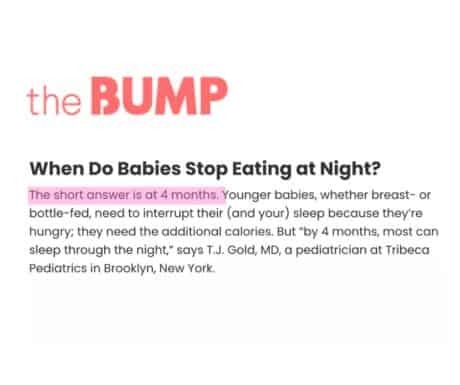Why is there so much BS around night feeds?
Let’s start by saying there is a lot of BS out there regarding night feeds!
I’m sure if you’ve searched online for anything related to night feeds, you’re just as confused as I am.
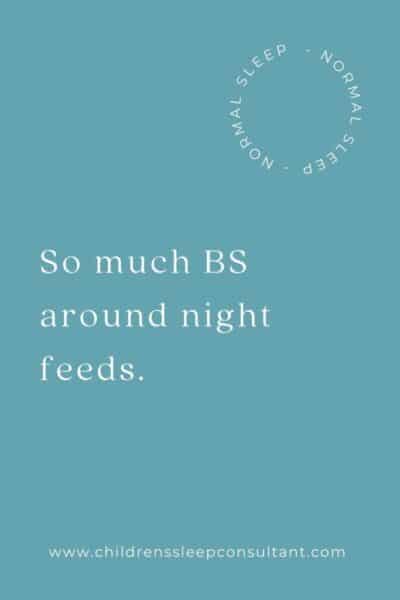
Millions of pages on the internet have information that is just wrong!
I searched for ‘when can my baby go without a night feed?’ not only did I get a bazillion web pages, but look at what Google decided to put in big, bold letters!
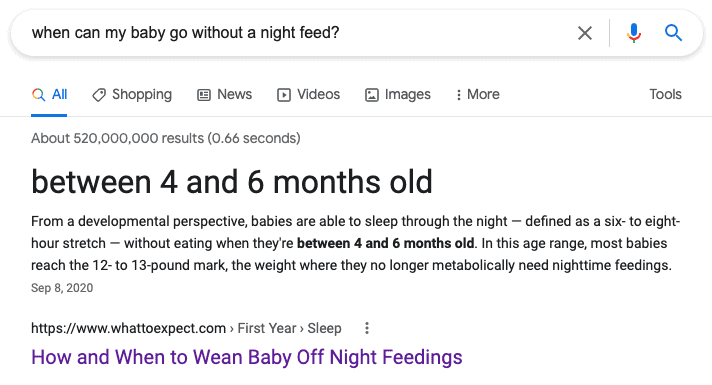
Look at these other quotes from the internet.
So, what is normal?
Let’s start by looking at what is normal. In a 2015 study of children aged between 6 and 12 months, 61.4% of children studied had one or more milk feeds during the night.
That means more children aged between 6 and 12 months wake at night to feed than not.
Why is the information so wrong?
A study done in the 1950s showed that 70% of 3-month-olds slept through the night.
This study is still used to determine when children should sleep through the night.
That’s data from nearly 70 years ago!
There are a couple of things we want to take into consideration here.
In the original study, they classed sleeping through the night as five consecutive hours of sleep between 12 am, and 5 am. That means babies weren’t feeding during the night between 12 am and 5 am, but they certainly could have been before midnight and after 5 am. The study doesn’t mention this at all.
We’re not sure how many children in the study were breastfed and how many were formula fed. Though the data isn’t widely known, it’s believed up to 90% of infants were formula fed in the 1950s. This is important because formula milk was very different from what it is now. There were no regulations about how it was made or its nutritional value. Formula milk took quite a long time to digest, and babies could go longer between feeds.
A five-hour stretch for a 3-month old formula-fed baby in 1957 was a fairly easy goal to reach, but not so much now. Breast and formula milk digests much quicker and is much gentler on little tummies than formula was 70 years ago.
Why is this outdated information harmful?
Parents look at many sources for information on when they can expect their child to stop feeding during the night; as most of the information online seems to guide toward 4 and 6 months of age, parents will often think something is wrong, especially if their child feeds many times a night. I’ve heard from mothers who think there must be something wrong with their breastmilk.
Families whose doctors told them they should cease feeding through the night at *insert any age, weight or developmental milestone. Imagine being told by the person you trust most with your child’s health that they should no longer feed their child during the night!
What can we do?
Families often come to me and ask me if I can help them eliminate night feeds.
Eliminating all-night feeds is not something I can always do; what I can do is help a child get down to the minimum amount of night feeds. Feeding is so much more than calories in. It’s the ultimate comfort for your child. If they need time to connect with you, they’ll feed. If they need a snuggle, they’ll feed. If they’re uncomfortable, they’ll feed. You get the picture here; there are many reasons your child may seek a feed during the night.
If your child continues to feed at night at 4, 6, 9, or 12 months old, it’s okay. Chances are, it’s normal. Of course, if you think your child is feeding too many times, reach out. Let’s see if we can get those feeds down to the minimum.
When have you been told that your child should no longer feed during the night?

Want more help gently sleep training?
I’ve got you covered. Join the membership to access…

Gentle sleep training support
 Over 40 masterclasses, helping you with sleep changes and issues.
Over 40 masterclasses, helping you with sleep changes and issues.

Get all your questions answered in a live weekly Q & A.

+ so much more – 1 on 1 opportunities, bedtime meditations, downloads, all the help you could need.



